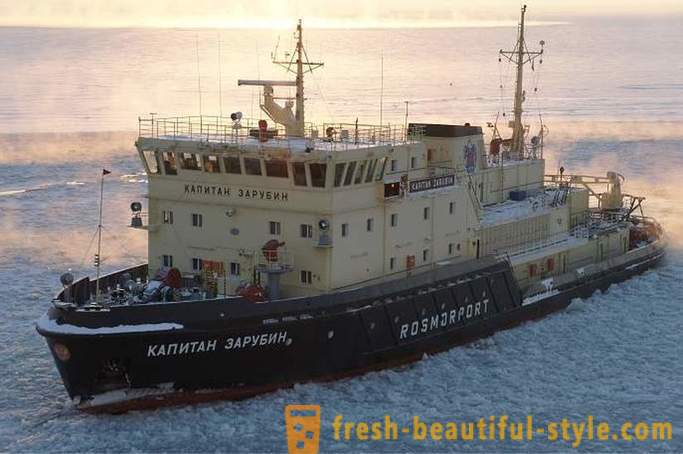Where will Russia if glaciers melt

For the last 23 000 years, the world's oceans is only due to the melting of glaciers has risen by 4, 6 meters. The increase of this indicator for two more meters will be catastrophic for millions of people. Complete disappearance of the ice in the Arctic, and this, according to some estimates, lead to an increase in sea level just seven or eight meters, will be disastrous for the entire planet. But what will happen in this case with Russia?
How much ice in the Arctic?
The Arctic holds about 10 percent of the planet's ice. However, its amount is constantly changing in the region. It depends on the season: in summer the ice cap melts, winter - restored, and on climate change. In this process, both naturally linked. In February 2017 the World Meteorological Organization (WMO) has determined that the amount of sea ice in the Arctic is 13, 38 million square kilometers, which is 260 thousand less than in January 2016. The reason for its reduction WMO experts have called the rise in global temperatures.
After the summer of 2017 the restoration of the ice in winter occurred less active in this regard, the area of the ice cap in the Arctic, according to estimates of the National Aeronautics and Space Administration (NASA), was 1, 6 million square kilometers less than the average for the last 20 years - only 4, 6 million. The decrease in ice area in the region, there is the fourth consecutive year, say the NASA's, reaching record levels. In this case, the minimum value observed in 2012, when the size of the ice cap and all declined to 3, 41 million square kilometers. Fortunately, after this was followed by an unusually cold summer 2013th and volume of the ice cover in the Arctic has increased by one third.
When the Arctic Ocean will cease to be the Arctic?
According to satellite data of the Office, the level of the world ocean rises by about three millimeters per year, and the last 25 years - seven centimeters. However, scientists are convinced that the process of ice melting will accelerate with time and by the end of the century the sea level will rise by 60-80 centimeters. More pessimistic views are held by researchers of the World Wildlife Fund: there waiting for increase of more than a meter. The Potsdam Institute for Climate Research, and all predict a rise of 130 centimeters. And some recent estimates coincide with the findings of the Intergovernmental Panel on United Nations climate change.
In the Arctic, the melting of the ice has almost disappeared perennial ice thickness greater than five meters, reported the Norwegian Polar Institute. According to the calculations of scientists, their share in the early 2010s was reduced from 28 to six percent. Compounding the situation is the fact that in some winter days the temperature rises to the point where the melting of the ice. All of this suggests that on a global scale to the point where in the Arctic Ocean will be ice does not, it is not far away. This will lead to the fact that sea levels will rise, according to some estimates, for seven or eight meters.
Whether Russia will go to the bottom?
The first results of the melting ice in the Arctic Russian inhabitants of the northern regions may have noticed with the naked eye. For example, East coast Siberian and Chukchi seas long cleared from the ice edge. However, if the water level rise of several meters, then rejoice that residents of coastal areas have long. With the effects of the loss of the northern ice in the first place have to fight coastal cities such as St. Petersburg and Astrakhan. Makhachkala and Taganrog, which are not so high in relation to the level of the sea, are not big trouble. Experts believe that as a result of a complete melting of ice in the world - and it will lead to an increase in global sea levels by 70 meters - these cities are completely submerged. However, the growth rate of seven meters is able to convert many Russian settlements in Venice. In addition, the vast sea may arise between Russia and Europe - as a result of the merger of the Baltic, Kara, Caspian and Black Seas. However, the probability of its formation due to the melting of Arctic ice is only one small. The water will flood Nizhnenemanskuyu lowland, in whose territory the Kaliningrad region, and the southern part of the Caspian depression. Then have complicated the cities along the banks of the Volga in the area from Volgograd to river flows into the Caspian Sea. Podtopit and White Sea lowland, located in the northwest of Russia in Karelia. It will also change the landscape in the North. So probably increase the sea area Lapetvyh and the East Siberian Sea at the expense of the North Siberian and Yano-Indigirka lowlands.
But in the Central Russia and the Far East sea level rise from melting ice in the Arctic will not be reflected. East European and West Siberian plains and Upland are over the sea for at least 100 meters, so they are not scared even the disappearance of the entire ice cover of the earth. Do not threaten flooding and the Urals. Minimal impact on waiting and the Crimea with the Krasnodar region.
How to prevent the threat?
Despite the fact that for Russia the consequences of melting ice will not be as devastating as the Netherlands or Australia, sea level rise will still force to solve the problem of resettlement of about 8 million people from the flooded areas. Fortunately, there is a critical moment of time: according to experts, the existing system of locks will allow sustain increase in the 60-80 centimeters. But think about to take the necessary measures - to build a new water protection facilities or build a special home - it's worth. However, it is hoped that not all researchers threatening forecasts come true. Indeed, scientists themselves emphasize that the reliability of long-term estimates are losing an estimated 20-25 years.













































